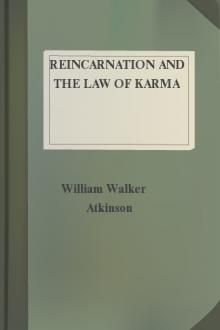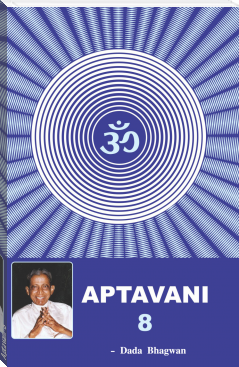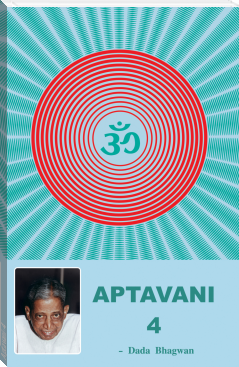Reincarnation and the Law of Karma - William Walker Atkinson (pocket ebook reader .txt) 📗

- Author: William Walker Atkinson
- Performer: -
Book online «Reincarnation and the Law of Karma - William Walker Atkinson (pocket ebook reader .txt) 📗». Author William Walker Atkinson
One of the strongest applications of the above mentioned form of the doctrine in India is the teaching that the caste of the man in his next incarnation will be determined by his degree of "good conduct" in the present life—and that his present caste has been determined by his conduct in his previous lives. No one who has not studied the importance of "caste" in India can begin to understand how powerful a lever this teaching is upon the people of India. From the exalted Brahman caste, the priestly caste—down to the Sudra caste of unskilled laborers, or even still further down to the Pariahs or outcasts, the caste lines are strongly marked; the higher caste person deeming it the greatest disgrace to be touched by one of an inferior caste, or to eat food prepared by a lower-caste person, and so on in every act of daily life. The only comparison possible to the American mind is the attitude of the old-time Southerner toward the lowest class of negroes, and even in this case the prejudice does not extend so far as in the case of the Hindus, for the Southerner will eat food cooked by a negro servant, and will permit the latter to shave him, act as his valet, etc., something at which the high-caste Hindu would be horrified on the part of one below him in caste. This being understood, it is easy to see how careful a high-caste Hindu would be to avoid performing actions which might rob him of his caste in his next life, and how powerful an incentive it is to a low-caste Hindu to strive for birth in a higher caste after many incarnations. To people holding such a view, birth in a low caste is the mark of crime and evil action performed in a previous life, and the low-born is accordingly felt to be worthy of no respect. We understand, from Hindu acquaintances, that this idea is gradually being dispelled in India, and an era of common human brotherhood and common interest is beginning to manifest itself.
In the Western world, the Reincarnationists, without doubt, have been greatly affected by the prevailing orthodox Hindu conception of Karma, rather than by the Grecian and general occult conception. Although there are many who regard Karma as rather a moulder of character, and consequently a prime factor in the re-birth, rather than as a dispenser of rewards and punishments—still, there are many who, discarding the orthodox Devil of their former faith, have found a worthy substitute for him in their conception of Karma, and manifest the same terror and fear of the new devil as of the old one—and his name may be summed up as FEAR, in both cases.
Theosophists have discussed the matter of Karma very thoroughly, and their leading authorities have written much about it, its various interpretations showing in the shades of opinion among the writers. Generally speaking, however, it may be said that they have bridged over the chasm between the "natural law" idea and that of "the moral law," with its rewards and punishments, by an interpretation which places one foot on each conception, holding that there is truth in each. Of course, justice requires the reference of that student to the Theosophical writings themselves, for a detailed understanding of their views, but we feel that a brief summary of their general interpretation would be in order at this place.
One of their leading authorities states that the Law of Karma is automatic in action, and that there is no possible escape from it. He likewise holds that Absolute Justice is manifested in its operations, the idea of mercy or wrath being absent from it; and that, consequently, every debt must be paid in full, to the last penny, and that there is no vicarious atonement or exceptions made in answer to supplications to a higher source. But he particularly states that this action of the law must not be confused with ordinary reward and punishment for "good deed or bad," but that the law acts just as does any other law of Nature, just as if we put our hand in the fire we shall be burned as a natural consequence, and not as a punishment. In his statement of this view he says: "We hold that sorrow and suffering flow from sin just precisely in that way, under the direct working of natural law. It may be said, perhaps, that, obviously, the good man does not always reap his reward of good results, nor does the wicked man always suffer. Not always immediately; not always within our ken; but assuredly, eventually and inexorably." The writer then goes on to define his conception of Good and Evil. He says: "We shall see more clearly that this must be so if we define exactly what we mean by good and evil. Our religious brothers would tell us that that was good which was in accordance with God's will, and that that was evil which was in opposition to it. The scientific man would say that that was good which helped evolution, and whatever hindered it was evil. Those two men are in reality saying exactly the same thing; for God's will for man is evolution, and when that is clearly realized all conflict between religion and science is at once ended. Anything, therefore, which is against evolution of humanity as a whole is against the Divine will. We see at once that when a man struggles to gain anything for himself at the expense of others he is distinctly doing evil, and it is evil because it is against the interest of the whole. Therefore the only true gain is that which is a gain for the race as a whole, and the man who gains something without cost or wrong to anyone is raising the whole race somewhat in the process. He is moving in the direction of evolution, while the other man is moving against it."
The same writer then gives the list of the three kinds of Karma, according to the Hindu teachings, namely: "1. There is the Samchita, or 'piled up' Karma—the whole mass that still remains behind the man not yet worked out—the entire unpaid balance of the debit and credit account; 2. There is the Prarabdha, or 'beginning' Karma—the amount apportioned to the man at the commencement of each life—his destiny for that life, as it were; 3. There is the Kriomana Karma, that which we are now, by our actions in this present life, making for the future." He further states: "That second type, the Prarabdha Karma, is the only destiny which can be said to exist for man. That is what an astrologer might foretell for us—that we have apportioned to us so much good or evil fortune—so much the result of the good and evil actions of our past lives which will react on us in this. But we should remember always that this result of previous action can never compel us to action in the present. It may put us under conditions in which it will be difficult to avoid an act, but it can never compel us to commit it. The man of ordinary development would probably yield to the circumstances and commit the act; but he may assert his free will, rise superior to the circumstances, and gain a victory and a step in evolution. So with a good action, no man is forced into that either, but an opportunity is given to him. If he takes it certain results will follow—not necessarily a happy or a wealthy life next time, but certainly a life of wider opportunity. That seems to be one of the things that are quite certain—that the man who has done well in this life has always the opportunity of doing still better in the next. This is nature's reward for good work—the opportunity to do more work. Of course, wealth is a great opportunity, so the reward often comes in that form, but the essence of the reward is the opportunity and not the pleasure which may be supposed to accompany the wealth." Another Theosophical writer says further on the subject of Karma: "Just as all these phases of Karma have sway over the individual man, so they similarly operate upon races, nations and families. Each race has its karma as a whole. If it be good, that race goes forward; if bad, it goes out—annihilated as a race—though the souls concerned take up their karma in other races and bodies. Nations cannot escape their national karma, and any nation that has acted in a wicked manner must suffer some day, be it soon or late." The same writer sums up the idea of individual unhappiness in any life, as follows: "(a) It is punishment for evil done in past lives; or (b) it is discipline taken up by the Ego for the purpose of eliminating defects or acquiring fortitude and sympathy. When defects are eliminated it is like removing the obstruction in an irrigating canal which then lets the water flow on. Happiness is explained in the same way—the result of prior lives of goodness."
The general idea of a number of writers on the subject of Karma is that "as ye sow, so shall ye reap," brought down to a wonderful detail of arrangement, and effect flowing from causes. This conception, carried to its logical conclusion, would insist that every single bit of pain and unhappiness in this life is the result of some bad deed done either in the present life or in the past, and every bit of happiness, joy or pleasure, the result of some good action performed either in the present or past life. This conception of Karma affords us the most intricate, complex and detailed idea of reward for good, and punishment for evil (even when called "the operation of natural law") possible to the mind of man. In its entirety, and carried to its last refinement of interpretation and analysis, it has a tendency to bewilder and terrify, for the chance of escape from its entangling machinery seems so slight. But still, the same authorities inform us that every soul will surmount these obstacles, and everyone will Attain—so there is no need to be frightened, even if you accept the interpretation of doctrine in its completeness.
But there are some thinkers who carry this idea of retributive Karma to such an extreme that they hold that every instance of physical pain, disease, deformity, poverty, ill fortune, etc., that we see among people, is the inevitable result of some moral wrong or crime committed by that person in some past life, and that therefore every instance of poverty, want or physical suffering is the just result of some moral offense. Some of the extremists have gone so far as to hesitate at relieving poverty, physical pain and suffering in others, lest by so doing they might possibly be "interfering with Karma"—as if any great Law could be "interfered with." While we, generally, have refrained from insisting upon our personal preference of interpretation in this work, we cannot refrain from so doing in this instance. We consider that such an interpretation of the Law of Karma is forced and unnatural, and results from the seeming natural tendency of the human mind to build up devils for itself—and hells of one kind or another. Robbed of their Devil, many people would





Comments (0)